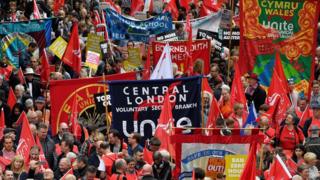 Image copyright
Reuters
Image copyright
Reuters
Thousands of people have joined a trade union march calling for a "new deal" for workers and public services.
The central-London demonstration, led by the Trades Union Congress (TUC), highlighted demands for better pay and job security.
TUC research said the UK's real wage squeeze would be the worst in modern history and the slowest for 200 years.
The government said its policies had boosted pay for the lowest earners and meant workers could keep more of it.
'Major earnings crisis'
The union data suggested wages in the UK had lagged behind inflation since 2008, and were worth £24 less in real terms than in 2008.
The TUC also said wages would not recover until 2025, by which time, it said, the average worker would have lost £18,500.
Official figures for employment and average earnings are due to be published next week. They may show average wage rises have risen above inflation for the first time in a year.
But that would not be enough to overturn the trend seen since the credit crisis, the TUC said.
It also said the current squeeze would amount to the biggest relative wage loss for 200 years.
'New mood'
The TUC's report comes as union members, peace campaigners and politicians joined thousands of workers to march through London.
TUC General Secretary Frances O'Grady said people had had enough of constant cuts to public services, poor quality jobs and low pay, adding: "There is a new mood in the country. People have been very patient but they are now demanding a new deal."
But a Treasury spokesperson said wages were forecast to grow faster than inflation in each of the next five years, and that government policies were helping British workers.
"Our National Living Wage has boosted pay for the lowest earners by over £2,000 already; we are cutting taxes to help people keep more of what they earn; and we are making sure people have the skills they need to secure high-quality, well-paid jobs by investing in technical education and boosting apprenticeships."
The TUC said its figures were based on annual average weekly earnings for total pay (including bonuses) adjusted with the CPI measure of inflation, which were then compared with long-run back data published by the Bank of England.
The forward-looking ones were based on the Office for Budget Responsibility forecast to 2022, and then a projection to 2025 using the average forecast growth rate for the 2018-22 period.